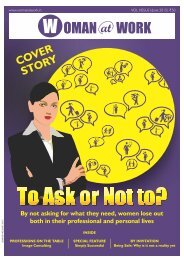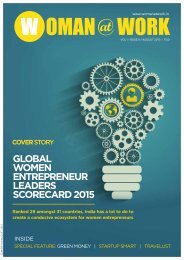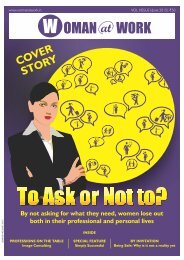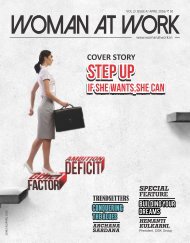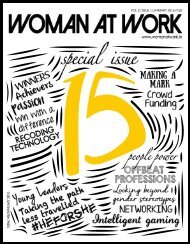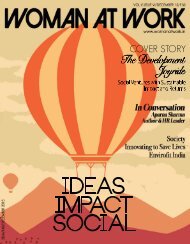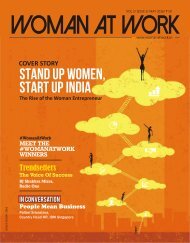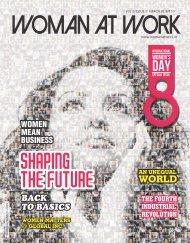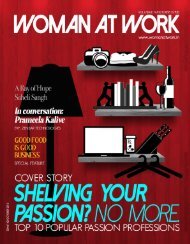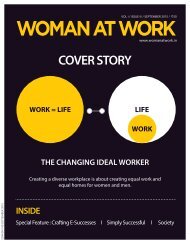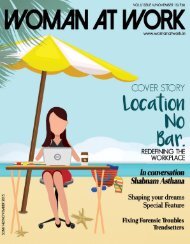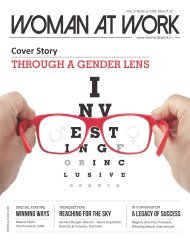February 2016 Woman At Work Digital
You also want an ePaper? Increase the reach of your titles
YUMPU automatically turns print PDFs into web optimized ePapers that Google loves.
TRENDSETTERS<br />
WW: Could you tell us what e-waste<br />
means? And what items or products<br />
qualify as e-waste?<br />
DK: E-waste is a popular, informal<br />
name for electronic products nearing<br />
the end of their ‘useful life’. Though it<br />
is often imagined as only old<br />
computers and mobile phones, they are<br />
only the ‘poster boys’ of e-waste. In<br />
fact, things like broken or unused<br />
electronic toothbrushes and razors,<br />
battery operated toys, toasters,<br />
washing machines, air conditioners,<br />
TVs, microwaves, servers, UPS and all<br />
kinds of things that work on electric<br />
view to do my master thesis on the<br />
topic, and ever since, it has also<br />
become my profession. Of course, the<br />
economics background still helps in<br />
understanding the market dynamics of<br />
e-waste, economic instruments for<br />
improving e-waste management,<br />
volatility in commodity prices and<br />
more. What is interesting about the<br />
e-waste as a topic is that it is so<br />
interdisciplinary in nature.<br />
WW: How does e-waste affect us?<br />
DK: The electronic and electrical<br />
equipments (EEE) are manufactured<br />
environment. These toxic metals get<br />
absorbed by the air or soil at the<br />
treating site and enter our ecosystem<br />
in an unstable and unhealthy way.<br />
WW: Where does Sofies come into<br />
the picture?<br />
DK: Sofies is a boutique consultancy<br />
working on a range of sustainability<br />
topics including e-waste, alternative<br />
fuels, cleaner production and<br />
sustainable planning and<br />
development. We are headquartered<br />
in Geneva, with offices in France and<br />
India. We work with international<br />
power are e-waste.<br />
WW: How did an economics<br />
doctorate student enter this niche<br />
field of e-waste management?<br />
DK: Totally by co-incidence! I was<br />
doing a Masters in International<br />
Management, and wanted to do my<br />
thesis related to sustainability. Just<br />
then, there was an opportunity for an<br />
internship on a Swiss funded project<br />
supporting e-waste management in<br />
several countries, including India. I<br />
applied for the internship with the<br />
with a complex mix of materials. Their<br />
components contain precious metals<br />
like gold, silver and copper, as well as<br />
hazardous substances such as cadmium<br />
and mercury. The problem arises due<br />
to the inefficient recycling of the EEEs<br />
to recover the precious metals. The<br />
informal or local scrap recyclers use<br />
basic processes such as open burning<br />
of the equipment to recover targeted<br />
metals like copper, aluminium, iron<br />
and steel. This leaves hazardous<br />
residues at the processing sites, causing<br />
an explosion of pollutants in the<br />
organisations, governments,<br />
companies and foundations among<br />
others in providing technical<br />
expertise, doing training and capacity<br />
building, technology transfer,<br />
supporting innovation and process<br />
improvements and more. In India,<br />
we are very strong in the<br />
e-wastesegment and sustainable<br />
planning and development,<br />
especially in the urban development<br />
context.<br />
<strong>February</strong> <strong>2016</strong> | 35



